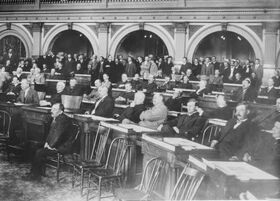
The Assembly is the lower house of the Congress, the legislative branch of the government of the United States of Mexico. As established by the Mexico City Constitution in 1820, the Assembly represents the people of the U.S.M.
The Assembly consists of 100 representatives, reapportioned among the states every ten years. As established by the Constitution, only free men were permitted to vote in Assembly elections, and since peons were not considered free under Mexican law, this limited the franchise to a virtual handful of people. Also, because apportionment was based on a complicated formula involving the free population, the state of Jefferson, with only one tenth of Mexico's population, had thirty-four seats in the Assembly at the time of the 1821 Mexican elections. However, Mexico's growing prosperity in the late 1820s made it possible for many Mexicano and Indian peons to leave the farms and plantations of Chiapas, Durango, and California, form small businesses, find employment in the export trade, or work in the new textile factories the French had opened in Chiapas, Durango, and Jefferson. Since they were no longer peons, these Mexicanos and Indians now had the vote, and the Assembly reapportionment of 1830 lowered Jefferson's representation and increased that of California, Durango, and Chiapas. These trends continued, so that by the time of the 1851 Mexican elections, Jefferson's representation in the Assembly had fallen to 24, while Durango also had 24, Chiapas had 9, and California had 29. Under President Arthur Conroy, a constitutional amendment was passed in 1865 that would base a state's representation in the Assembly on its voting population.
The Assembly introduced all domestic legislation, but as established in 1820 it was necessary for a measure to pass two times, at a six month interval, before being sent to the Senate for consideration. A second constitutional amendment passed in 1865 eliminated the need for a second passage by the Assembly.